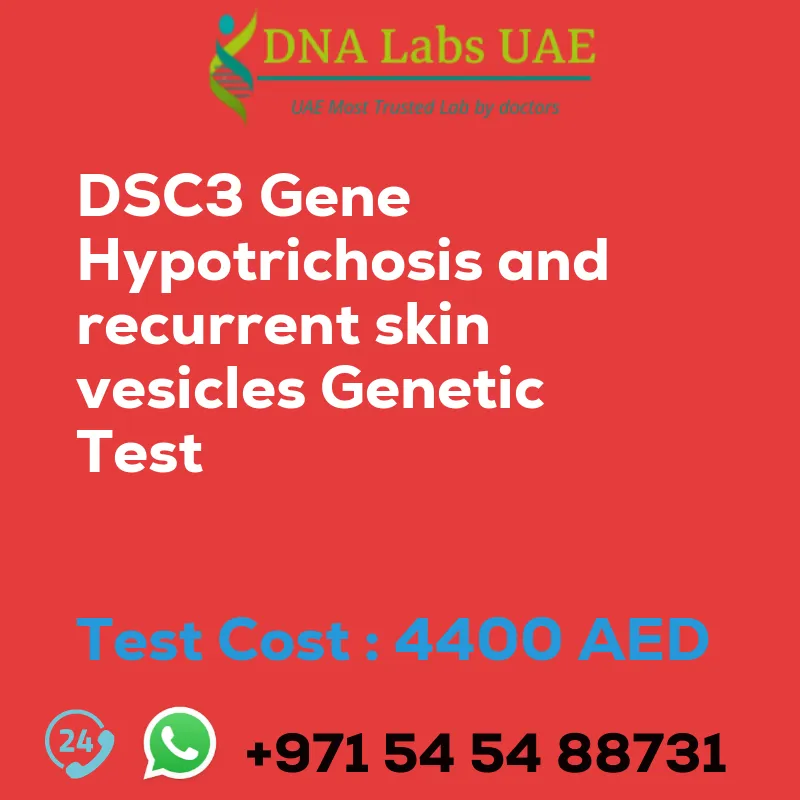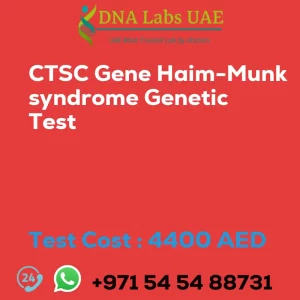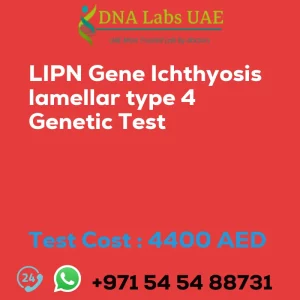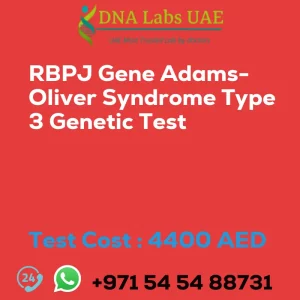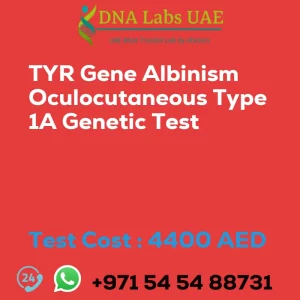DSC3 Gene Hypotrichosis and Recurrent Skin Vesicles Genetic Test
At DNA Labs UAE, we offer the DSC3 Gene Hypotrichosis and Recurrent Skin Vesicles Genetic Test. This test is designed to diagnose and identify genetic mutations associated with DSC3 gene hypotrichosis and recurrent skin vesicles. The test is available for the price of AED 4400.0.
Test Components
- Price: 4400.0 AED
- Sample Condition: Blood or Extracted DNA or One drop Blood on FTA Card
- Report Delivery: 3 to 4 Weeks
- Method: NGS Technology
- Test Type: Osteology Dermatology Immunology Disorders
- Doctor: Dermatologist
- Test Department: Genetics
Pre Test Information
Prior to undergoing the DSC3 Gene Hypotrichosis and Recurrent Skin Vesicles Genetic Test, it is important to provide the clinical history of the patient. Additionally, a genetic counseling session will be conducted to draw a pedigree chart of family members affected by DSC3 Gene Hypotrichosis and Recurrent Skin Vesicles Genetic Test gene DSC3.
Test Details
DSC3 gene hypotrichosis is a condition characterized by sparse hair growth or hair loss, caused by mutations in the DSC3 gene. The DSC3 gene is responsible for producing a protein called desmocollin-3, which is vital for proper functioning of hair follicles.
Recurrent skin vesicles, on the other hand, refer to the formation of fluid-filled blisters on the skin that reoccur over time. These vesicles can be caused by various factors, including genetic mutations, autoimmune disorders, or infections.
NGS (Next-Generation Sequencing) genetic testing is a technique used to analyze multiple genes simultaneously to identify genetic variations or mutations associated with a particular condition. In the case of DSC3 gene hypotrichosis and recurrent skin vesicles, NGS genetic testing can help identify mutations in the DSC3 gene or other genes involved in hair growth and skin health.
By identifying the specific genetic mutations responsible for these conditions, NGS genetic testing can provide valuable information for diagnosis, prognosis, and treatment planning. It can also assist in genetic counseling and family planning by determining the risk of passing on the condition to future generations.
| Test Name | DSC3 Gene Hypotrichosis and recurrent skin vesicles Genetic Test |
|---|---|
| Components | |
| Price | 4400.0 AED |
| Sample Condition | Blood or Extracted DNA or One drop Blood on FTA Card |
| Report Delivery | 3 to 4 Weeks |
| Method | NGS Technology |
| Test type | Osteology Dermatology Immunology Disorders |
| Doctor | Dermatologist |
| Test Department: | Genetics |
| Pre Test Information | Clinical History of Patient who is going for DSC3 Gene Hypotrichosis and recurrent skin vesicles NGS Genetic DNA Test. A Genetic Counselling session to draw a pedigree chart of family members affected with DSC3 Gene Hypotrichosis and recurrent skin vesicles NGS Genetic DNA Test gene DSC3 |
| Test Details |
DSC3 gene hypotrichosis refers to a condition characterized by sparse hair growth or hair loss, which is caused by mutations in the DSC3 gene. The DSC3 gene provides instructions for producing a protein called desmocollin-3, which is essential for the proper functioning of hair follicles. Recurrent skin vesicles, on the other hand, refer to the formation of fluid-filled blisters on the skin that reoccur over time. These vesicles can be caused by various factors, including genetic mutations, autoimmune disorders, or infections. NGS (Next-Generation Sequencing) genetic testing is a technique used to analyze multiple genes simultaneously to identify genetic variations or mutations that may be associated with a particular condition. In the case of DSC3 gene hypotrichosis and recurrent skin vesicles, NGS genetic testing can help identify mutations in the DSC3 gene or other genes involved in hair growth and skin health. By identifying the specific genetic mutations responsible for these conditions, NGS genetic testing can provide valuable information for diagnosis, prognosis, and treatment planning. It can also help in genetic counseling and family planning by determining the risk of passing on the condition to future generations. |

